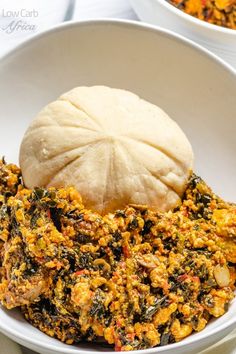Nigeria’s rich culinary traditions offer a wide array of ingredients that can form the basis of a healthy, balanced diet. With a focus on locally-sourced foods, nutrient-dense ingredients, and plant-based options, a healthy Nigerian diet can support overall wellness while honoring traditional flavors and cooking techniques. Nigerian cuisine has always featured a variety of grains, leafy greens, root vegetables, and protein sources, making it ideal for those looking to adopt a balanced eating plan that supports heart health, weight management, and vibrant energy.
This article will explore the essential components of a healthy Nigerian diet, provide guidance on portion control, and offer tips on making healthy Nigerian-inspired meals that can fit into various lifestyle goals.
Core Principles of a Healthy Nigerian Diet

When building a healthy diet, incorporating a range of indigenous ingredients and focusing on whole foods is key. Nigerian cuisine has several health-supportive qualities that make it possible to create delicious and nutritious meals. Below are some principles to consider:
- Balanced Macronutrients: The Nigerian diet can easily include a balance of proteins, carbohydrates, and healthy fats, thanks to foods like beans, yams, and fish.
- High Fiber Content: Nigerian foods are often rich in fiber, particularly with the use of whole grains and leafy greens, which support digestive health.
- Low Sugar Intake: Traditional Nigerian meals are low in added sugars, which benefits blood sugar management and energy stability.
By following these principles, a healthy Nigerian diet can contribute to improved wellness and a sustainable approach to eating.
Nutrient-Rich Ingredients in Nigerian Cuisine
Nigerian dishes incorporate many nutrient-dense ingredients that provide essential vitamins, minerals, and fiber. Here are some of the healthiest staples in Nigerian cooking:
- Leafy Greens
Nigerian cuisine includes a wide variety of leafy greens like spinach, pumpkin leaves, and fluted pumpkin (ugu). These greens are high in vitamins A and C, essential for immunity and skin health, as well as fiber, which aids digestion. - Root Vegetables
Yams, sweet potatoes, and cassava are common staples in Nigeria, providing complex carbohydrates for sustained energy. These vegetables are also packed with potassium and magnesium, which are crucial for heart health. - Beans and Legumes
Beans are a core source of plant-based protein in the Nigerian diet, offering fiber and essential nutrients without excess fat. Varieties like black-eyed peas and brown beans are popular in dishes such as moi-moi and akara. - Whole Grains
Millet, sorghum, and brown rice are examples of Nigerian whole grains. These grains are high in fiber and promote digestive health while helping to maintain steady blood sugar levels. - Fish and Seafood
Coastal areas in Nigeria incorporate fish into their diets frequently, as it’s rich in omega-3 fatty acids that support heart health. Fish varieties like tilapia, catfish, and crayfish are nutrient-dense and provide lean protein. - Fermented Foods
Traditional Nigerian foods like ogi (fermented cereal pudding) contain probiotics that support gut health. These fermented foods are beneficial for digestion and can enhance the immune system. - Spices and Herbs
Nigerian cooking relies on a variety of flavorful spices and herbs like ginger, garlic, and pepper. These ingredients not only add flavor but also contain anti-inflammatory and immune-boosting properties.
Portion Control and Weight Management

A common challenge in maintaining a balanced diet is portion control. Nigerian meals can be calorie-dense, so being mindful of serving sizes is crucial, especially when trying to manage weight or improve heart health. Here are some tips for incorporating portion control:
- Measure Grains and Starches
Foods like jollof rice and yam porridge are nutritious, but consuming them in large amounts can add extra calories. Aiming for moderate portions of these carbohydrate sources can help maintain energy without excess caloric intake. - Balance Protein and Fiber
Including a mix of protein-rich foods like beans and fiber-dense vegetables in each meal can keep you feeling fuller for longer, making it easier to manage portion sizes. - Limit Oils and Fats
While healthy oils are essential, using them sparingly can reduce calorie intake. Opt for oils like palm oil and olive oil in moderate amounts for a heart-healthy fat source.
Healthy Cooking Techniques in Nigerian Cuisine
Adopting traditional Nigerian cooking methods can add variety to a healthy eating plan. Below are a few methods that retain nutrients and enhance flavor:
- Steaming and Boiling: These techniques are often used for vegetables, yams, and beans, preserving nutrients without adding unnecessary fats.
- Roasting and Grilling: Roasting fish or vegetables enhances flavor without requiring added oils, making it ideal for low-calorie, nutritious meals.
- Fermenting: Fermentation, as seen with ogi and fermented locust beans, supports gut health and adds depth to dishes.
Heart-Healthy Nigerian Foods
Certain foods in the Nigerian diet are especially beneficial for cardiovascular health:
- Fish: With its omega-3 content, fish is a heart-healthy protein that supports cholesterol management.
- Leafy Vegetables: Rich in antioxidants and low in calories, leafy greens reduce inflammation and promote heart wellness.
- Whole Grains: Foods like millet and sorghum are high in fiber and help regulate blood pressure.
Meal Planning Tips for a Balanced Nigerian Diet
Creating a healthy Nigerian meal plan that meets all nutritional needs can be simple with a few guidelines:
- Focus on Whole Foods
Whole foods like beans, yams, and vegetables should form the base of each meal, providing the necessary macronutrients and fiber. - Include Diverse Protein Sources
For those seeking more variety, try rotating plant-based proteins with fish, eggs, and lean meats. - Prioritize Fresh Produce
Including a mix of fresh fruits and vegetables daily will add a range of vitamins and minerals essential for immunity and energy. - Limit Processed Ingredients
Highly processed ingredients can detract from the nutritional quality of meals, so opt for fresh, minimally-processed options wherever possible.
Healthy Nigerian Snacks and Treats
A healthy diet doesn’t mean giving up snacks or treats entirely. Nigerian cuisine offers several nutritious snack options:
- Fruit Bowls: Seasonal fruits like pineapple, mango, and watermelon provide natural sweetness and vitamins.
- Moi-Moi: Made from steamed beans, moi-moi is a high-protein, low-fat snack that’s filling and nutrient-rich.
- Nuts and Seeds: Cashews, groundnuts, and pumpkin seeds are great for snacking, as they offer healthy fats and fiber.
Conclusion
A healthy Nigerian diet provides a wealth of nutritional benefits, from improved heart health to balanced energy levels. By focusing on whole foods, portion control, and traditional cooking methods, it’s possible to enjoy the vibrant flavors of Nigerian cuisine while supporting long-term wellness goals. Incorporating locally-sourced, nutrient-dense ingredients into your diet is a sustainable way to promote health, honor Nigerian culture, and enjoy delicious meals every day.

